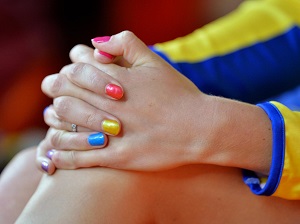By Hanna van Leent
Staff Writer
Ice Skating has always been part of my family: my grandmother, my mother and I all can ice skate, and we watch various competitions every year during those cold and dark winter days. As a Dutch native, I have cheered for most professional Ice Skaters from the Netherlands for the last 15 years. Some of the names include Rintje Ritsma, Ireen Wüst, Renate Groenewold, and of course the hero on skates at the moment: Sven Kramer. Wüst and Kramer will compete for the Dutch team in the 2014 Olympic Winter Games in Sochi, Russia.
The associations with ice-skating up to now, a very romantic and happy picture of people cheering in front of the television and heroes on ice, are good. Nevertheless, there are some issues lurking in the shadows that we cannot ignore, and that are almost impossible to bring into discussion in Russia.
During the last few years, Russia has passed laws that make it almost impossible to have or discuss a ‘non-traditional’ sexual preference. These laws affect the world of sport as well. Sportsmen and women are forbidden to talk about anything related to the LGBT community, let alone show any evidence that they might be lesbian, gay, bisexual, or transgendered themselves during their time in Sochi, which happens to be president Putin’s hometown.
Since 2006, laws banning any public display of homosexuality in Russia have tightened, and nowadays, there is a ban on gay pride, such as any protests in favor of gay rights, which is seen as distributing so called ‘gay-rights propaganda’. Furthermore, there is no protection against the discrimination of people with other sexual preferences and same sex marriages or adoptions by same sex couples are forbidden.
There is little to no light in this dark painting regarding gay rights. Most of the bans in Russia were created in the beginning of the 21st century and outlawing the right to express different sexual preferences in front of minors has been this year’s activity. This means that in most public spaces you cannot openly be gay and you cannot talk about having a “different”, that is, gay sexual preference in front of people younger than 16. Basically, as a gay person you always have to be on the alert.
These laws clash with the vision statements made by the International Olympic Committee (IOC). In The Fundamental Principles of Olympism it is mentioned that the IOC will act against any form of discrimination affecting the Olympics Movement. Sportsmen and women not being able to express their sexual preference during the Olympic Games (which includes not being able to thank one’s spouse when they are of the same sex), is a violation of equality and freedom of expression as stated in the Universal Declaration of Human Rights, signed by Russia.
Recently, Stephen Fry, a famed British author and activist, submitted a public letter to British Prime Minister David Cameron stating that he wished the Olympic Winter Games to be banned this year. While his sentiments are shared, a boycott is very unlikely to happen. Instead of cutting down the debate by boycotting it, I would like to see a worldwide discussion opened during the Winter Games, not only on gay rights, but also on human rights in general.
Freedom of expression is banned in many countries; opinions, thoughts and protests are banned and free thought in schools is smothered. In China, Saudi Arabia, Ethiopia, but also in Mexico, there is no freedom of press and in the U.S., not every state has laws against the discrimination of homosexuals and transsexuals. These are only a few examples on the incredibly long list that exists. There are not only problems with freedom in Russia; we also have to look critically at the country in which we currently reside: the Netherlands.
Discrimination of race, sexual preference and gender are problems that occur frequently. There are still problems with employment of people who originate from for example Morocco or Turkey and homosexuals are frequently being harassed or even beaten up.
The difference is that in the Netherlands we can drag someone into court for these violations of our rights, but in many other countries this is not the case. A discussion about these rights, as well as peaceful protests and demonstrations can be the start of change. Accordingly, the IOC should read their own statements again and conclude that an opinion from their side is necessary, especially after Russia’s statement that the new laws will be valid during the Olympic Games as well.
I am not sure myself whether I will watch the Olympic Winter Games this year. I certainly will think and talk about my freedom to express my thoughts in Tabula Rasa, in University, and as a citizen of the Netherlands during the course of the Olympic Winter Games. It seems that even today, being able to express your opinions, thoughts and identity is still something rare, and I am thankful that I live in one of the few countries where this is possible.

Hanna van Leent, class of 2015, is a History major from Rodenrijs, the Netherlands.
